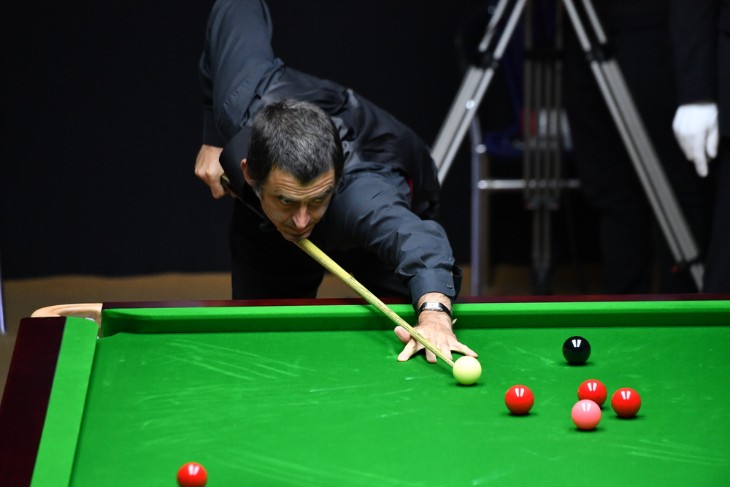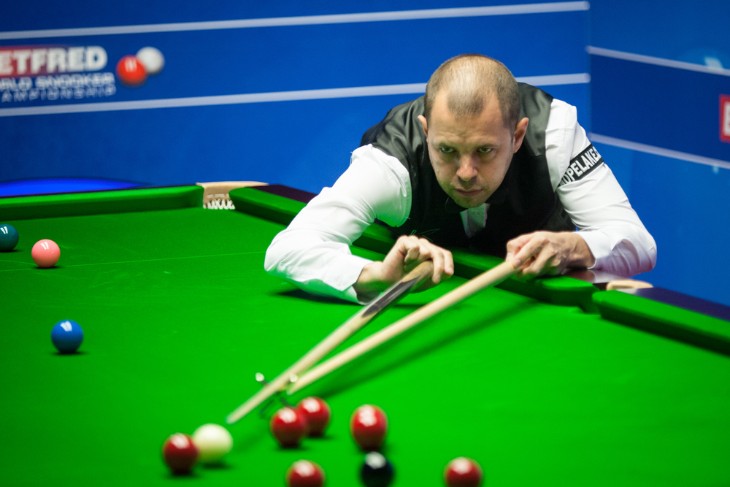Snooker, beyond being a game of precision and technique, is also a battle of the mind. The psychological aspect of the sport plays a pivotal role in determining a player's success. Whether it's maintaining focus during a critical shot, managing nerves under pressure, or strategizing their way through a frame, top snooker players understand the profound impact of psychology on their performance. In the world of snooker, the mental aspect can often be the difference between victory and defeat.
One of the key psychological factors in snooker is maintaining a high level of concentration throughout a match. A single lapse in focus can result in a missed shot or positional error, potentially costing a player the frame. This need for sustained concentration is mentally taxing and requires players to develop strategies for staying locked in, even in the face of distractions or pressure. It's not uncommon to see top players engage in deep breathing exercises or other mental rituals to help maintain their focus.
Mental Strength in Snooker
Mental strength is the backbone of success in snooker. It encompasses various facets, including resilience, self-confidence, and emotional control. The ability to rebound from setbacks is crucial in a sport where the margins of error are slim. Top snooker players often face challenging situations, such as missing a crucial pot or experiencing a streak of bad luck. Mental strength enables them to maintain their composure, analyze their performance objectively, and make the necessary adjustments to bounce back.
Self-confidence is another vital element of mental strength. Snooker players must believe in their abilities and trust their judgment on the table. This confidence not only impacts shot selection but also influences a player's demeanor and body language, which can, in turn, affect their opponent's mindset. Confidence breeds a sense of control, and top snooker players understand that projecting confidence can be a strategic advantage in a match.
Emotional control completes the triad of mental strength in snooker. Emotions like frustration, anxiety, or anger can easily disrupt a player's focus and decision-making. Learning to manage and channel these emotions constructively is a skill honed by top snooker players. They acknowledge their feelings without letting them dictate their actions on the table, thereby maintaining a clear and rational mindset.
Focus and Concentration
In the world of snooker, where precision and accuracy are paramount, the ability to maintain unwavering focus and concentration is a defining trait of top players. The sport demands meticulous attention to detail, from aligning the cue accurately to controlling the position of the cue ball. Achieving this level of concentration can be particularly challenging in high-stakes situations, such as crucial frames in a tournament.
To excel in this aspect, top snooker players often employ various techniques to hone their focus. Deep breathing exercises, mindfulness, and visualization are some of the strategies they utilize. Deep breaths help in calming the nerves and enhancing concentration, while mindfulness techniques enable players to stay present in the moment, minimizing distractions. Visualization, on the other hand, helps them mentally rehearse shots and scenarios, allowing them to be better prepared when they face them in a match.
Moreover, maintaining focus extends beyond the physical act of potting balls. It involves reading the table, analyzing angles, and planning a series of shots ahead. The ability to think several moves ahead while remaining in the moment is a testament to the mental prowess of top snooker players.

Pressure Management
Pressure is an omnipresent companion in the world of competitive snooker. Matches, especially in high-stakes tournaments, can be mentally taxing, with the weight of expectations, audience, and personal aspirations bearing down on players. Successful snooker players recognize the significance of managing this pressure effectively.
One crucial aspect of pressure management is staying calm under duress. The ability to maintain composure during tense moments is a hallmark of top snooker players. They often have routines or rituals that help them regulate their breathing and emotions. Deep breaths and positive self-talk are common tools they employ to keep anxiety at bay.
Another facet of pressure management is accepting the inevitability of mistakes. Snooker is a sport where perfection is rare, and even the best players make errors. Embracing these mistakes as part of the game and learning from them is essential for mental resilience. By doing so, top snooker players can prevent a single missed shot from spiraling into a series of errors and maintain a competitive edge.
Visualization and Imagery
Visualization and imagery are powerful tools that top snooker players employ to enhance their performance. The ability to mentally rehearse shots and visualize the path of the cue ball is instrumental in executing precise shots on the snooker table. By closing their eyes and vividly picturing the entire process, from addressing the cue ball to potting the object ball, players can create a mental blueprint for success.
Visualization serves several purposes in snooker. Firstly, it instills confidence. Players can mentally see themselves executing flawless shots and making critical pots under pressure. This positive imagery boosts self-belief and contributes to a calm and composed demeanor on the table. Secondly, visualization helps in planning and strategizing. Players can envisage the positional play they need to employ to navigate the table effectively. This mental preparation is invaluable in snooker, where one shot's success often hinges on the next.
To harness the power of visualization, top snooker players dedicate time in their practice routines to mental exercises. They sit quietly, visualize their shots, and practice this aspect of the game just as diligently as their physical shots. The result is a honed ability to execute what they've mentally practiced when the time comes during a match.
Confidence Building
Confidence is a cornerstone of success in snooker. Without self-belief, a player's abilities may remain untapped. Building and sustaining confidence is a continual process for top snooker players. It starts with setting achievable goals and working towards them. By breaking down their long-term objectives into smaller, manageable steps, players can track their progress and build confidence with each accomplishment.
Moreover, confidence in snooker is closely tied to consistency. Players strive to maintain a consistent approach to their shots and routines. This predictability not only enhances their shot-making but also fosters a sense of control over the game. Confidence is bolstered when players can rely on their skills under varying circumstances, knowing that they have honed their abilities to a high level of precision.
Self-talk is another tool in the arsenal of top snooker players. They consciously cultivate a positive inner dialogue. This self-affirmation helps to combat self-doubt and negative thoughts that may arise, particularly in pressure situations. By consistently reinforcing positive beliefs in their abilities, they can remain confident even when the stakes are high.
Goal Setting
Goal setting is a fundamental aspect of success in snooker. Top players understand the importance of defining clear, achievable objectives to guide their progress and keep themselves motivated. In the context of snooker, goals can encompass various aspects, from improving specific skills to achieving milestones in tournaments.
To be effective, goals in snooker need to be SMART: Specific, Measurable, Achievable, Relevant, and Time-bound. For example, a player may set a goal of improving their long potting accuracy by a certain percentage within a specified timeframe. This goal is specific (improving long potting), measurable (by a percentage increase), achievable (based on their current skill level), relevant (to their overall game), and time-bound (within a set timeframe).
By breaking down their long-term aspirations into these SMART goals, snooker players create a roadmap for their development. It gives them a clear sense of direction and allows them to track their progress. Achieving these smaller milestones not only builds confidence but also provides tangible evidence of improvement, reinforcing their commitment to the sport.
Additionally, goal setting in snooker extends beyond skill improvement. It can encompass achieving specific tournament results or maintaining consistency in performance. The process of setting and achieving goals is an ongoing cycle that top snooker players embrace as part of their journey towards success.
Emotional Control
Emotions run high in the world of snooker, especially during competitive matches. How players manage their emotions can significantly impact their performance. Emotional control involves acknowledging one's feelings and responding to them in a constructive manner.
For instance, frustration is a common emotion in snooker, particularly after missing a crucial shot. Top players recognize the importance of channeling this frustration into positive energy. Instead of dwelling on the mistake, they focus on the next shot, using the frustration as motivation to improve. This ability to quickly shift their emotional state is a hallmark of emotional control.
Similarly, anxiety and nervousness can be overwhelming in high-pressure situations. Top snooker players often employ relaxation techniques like deep breathing to calm their nerves and regain focus. These methods help them stay composed and make clear decisions even when the stakes are high.
Moreover, maintaining a positive attitude is crucial in snooker. Players understand that self-criticism and negativity can be detrimental to their performance. They practice self-compassion and strive to stay optimistic, even in challenging moments. This mental resilience enables them to handle adversity with grace and maintain their competitive edge.
The Importance of Routine
Routine is a cornerstone of success in snooker. Top players understand that consistency in their approach, both on and off the table, can yield significant benefits. A well-defined pre-match routine sets the stage for success by helping players enter a focused and confident state of mind.
Before a match, top snooker players follow a carefully crafted routine that includes physical warm-up exercises, mental preparation, and even dietary considerations. These rituals serve multiple purposes. Physically, warm-up exercises ensure that players are in peak condition, with their muscles relaxed and their bodies ready to perform at their best. Mentally, these routines help players shift their focus from external distractions to the task at hand, creating a mental "zone" where they can concentrate fully on the game.
During the match, routines continue to play a crucial role. Players meticulously assess each shot, considering factors like cue ball position, angles, and the order of potting balls. This systematic approach ensures that they remain in control of the game, minimizing errors and maximizing opportunities.
Beyond the match itself, post-game routines are equally important. Players often review their performance objectively, analyzing their strengths and areas for improvement. This commitment to continuous self-assessment allows them to refine their skills and strategies over time.
Resilience and Adaptability
Resilience and adaptability are twin pillars of success in snooker. The sport is known for its unpredictability, with each frame presenting unique challenges. Top snooker players are masters at rebounding from setbacks and adapting to changing circumstances.
Resilience, in the context of snooker, refers to the ability to bounce back from unfavorable situations. Whether it's a missed shot, a streak of bad luck, or a substantial point deficit, top players maintain their composure and mental fortitude. They understand that dwelling on past mistakes or misfortunes only hinders their performance. Instead, they focus on the immediate task at hand, seeking opportunities to turn the tide in their favor.
Adaptability is equally crucial. Snooker tables can vary in conditions, and opponents may have different playing styles. Top players have the ability to adjust their game to suit these changing factors. They may alter their shot selection, change their positional play, or modify their strategies to gain an edge. This adaptability keeps them competitive in a sport where versatility is a valuable asset.
Moreover, top snooker players are adept at reading their opponents and making tactical adjustments during a match. They analyze their opponent's strengths and weaknesses and use this information to exploit vulnerabilities and seize opportunities.

Learning from the Masters
One of the invaluable resources for aspiring snooker players is the wealth of knowledge and experience shared by the masters of the game. Top snooker players often take inspiration from those who have achieved greatness before them. Interviews, autobiographies, and documentaries featuring legendary players offer valuable insights into their mindset, work ethic, and strategies.
By studying the journeys of these snooker legends, aspiring players gain a deeper understanding of what it takes to excel in the sport. They learn about the discipline and dedication required, as well as the mental fortitude needed to navigate the highs and lows of competitive snooker. Moreover, hearing about the challenges and setbacks that legendary players faced on their path to success can be motivating and reassuring for those in the early stages of their careers.
Learning from the masters also extends to on-table strategies and shot selections. Aspiring players analyze the playing styles of top professionals, attempting to incorporate elements that align with their own strengths and preferences. This process of emulation and adaptation allows them to refine their own game and develop a unique approach that suits their individual skills.
Conclusion
In conclusion, the psychology of winning in snooker is a multifaceted domain that encompasses a blend of mental attributes, strategies, and continuous learning. Top snooker players understand that success is not solely determined by their physical skills but also by their mental fortitude, goal-oriented approach, and adaptability. By embracing these principles, aspiring players can chart their own paths to success in the world of snooker.
For more information:




.webp)


 (1).webp)




















